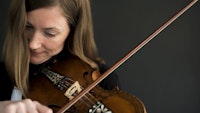Field of study: Performance Practice
Marianne Berglöf: The Music Drama as 'Ereignis'

Post-structuralist performances of Wagner's 'Der Ring des Nibelungen' as a challenge for musicological conceptualisation.
Summary
With Gesamtkunstwerk, Richard Wagner created a groundbreaking genre in 19th-century musical drama (opera), and since its premieres it has been the subject of continuous interest in various musicological disciplines. Wagnerian music drama has been explored and analysed from an almost infinite number of methods and angles: From classical form analysis to structuralist analysis and methods based on critical literary theory, analytical philosophy and musical narration, to name but a few.
On the other hand, Wagner's own statements about the ontology of Gesamtkunstwerk, as expressed in his aesthetic treatise Oper und Drama, have received limited attention. In view of the synthesising idea that underlies Gesamtkunstwerk, the marginal interest of Wagner scholars in musical theatre is therefore striking, not least because throughout his active creative period Wagner almost exclusively created for and worked within musical theatre, as conductor, director, dramatist and composer.
The performative turn within the disciplines of musicology and theatre studies has become fundamental to understanding the unique performance character of music and theatre and has led to the relationship between score and performance being considered in a new light. In the wake of this paradigm shift, methodological challenges in musicology follow; conceptualisations that incorporate the performative dimension become inevitable and have far-reaching consequences for the concept of ‘analysis’.
This study is an examination and problematisation of the analytical methods of musicology, on the basis of a performative definition of music-dramatic performances. It discusses and demonstrates that performance practice in recent decades is difficult to incorporate into models where the performance is assumed to be a reproduction of the score. Using examples from post-structuralist performances of Wagner's Der Ring des Nibelungen, the aim is to show that new methods of analysis must be established if the performative identity of the performance is to be preserved. To this end, the thesis highlights performative aesthetics and posthermeneutic theories as possible bases for rethinking the concept of ‘analysis’. By reading the aesthetic writings from a performative perspective, the thesis illustrates the innovative nature of Wagner's music-dramatic thinking, where the performance constitutes the Gesamtkunstwerk.
The dissertation
The full title of the dissertation is (translated from Norwegian): The musical drama as Ereignis. Poststructuralist productions of Wagner's Der Ring des Nibelungen as a challenge to musicological conceptualisation.
The study is presented as a monograph, and it is available in the Norwegian Research Information Repository (nva.sikt.no). The dissertation is written in Norwegian.
Articles relevant
Published: Jun 9, 2022 — Last updated: Feb 26, 2026
